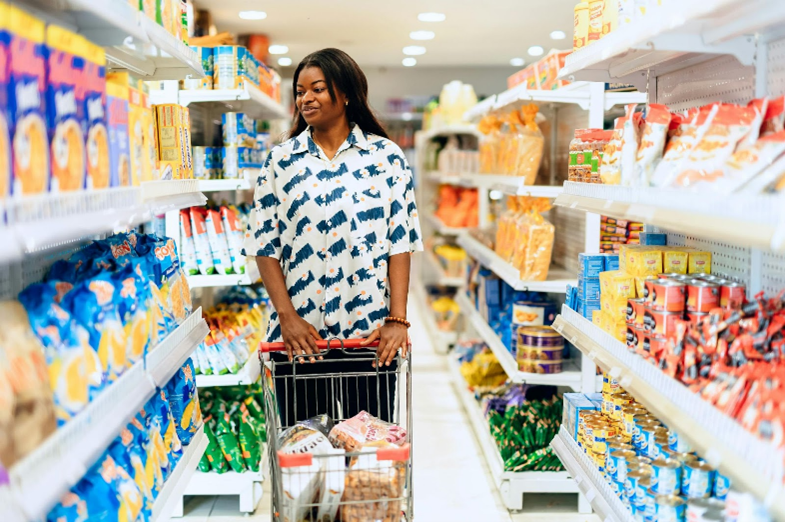
Guest article by Sophie Corcut, Food Retail Sustainability Manager
In this guest ‘long read’, Sophie Corcut describes how retailer accelerator and incubator programmes have potential to be a launchpad for challenger brands. If we’re to avoid UK shelves being filled with more ‘bubblegum crisps’ though, there needs to be a more explicit focus on promoting fairness, diversity, nutrition and sustainability.
When I worked for Spinneys’ Dubai, a premium supermarket chain in the Middle East, the company launched its ‘Business Incubator Programme’. It was a ‘Dragon’s Den’ style ‘elevator pitch’ opportunity for ‘challenger brands’ – young, innovative and values-led businesses – to make it onto the shelves of a major retailer.
For successful ‘winners’, the scheme swept away typical barriers to entry, such as ‘listing fees’ (required for getting new products set up on supermarket systems, into warehouses, on to shelves, marketed, and so on) and offered longer-than-usual stocking guarantees. This gave brands time to raise awareness and grow sales. Winners also received mentoring, guidance and training, maximising their chances of scaling both within, and eventually beyond, the retailer.
The driver behind Spinneys’ Incubator was partly commercial – a pipeline of distinctive new products – but also explicitly about sustainability and community development. The programme helped genuinely tiny startups, some literally producing from kitchen tables, to scale into supermarket-listed brands, such as Zahra’s Kitchen (nutritious ready meals) and The Botanist (natural cleaning products). Not every startup survived – food and drink ventures are notoriously high risk – but the programme demonstrated the potential of incubators to give small values-led businesses a meaningful shot at growth.
In 2024, five UK supermarkets – Tesco, Iceland, Co-op, Ocado and Waitrose – launched similar schemes, with subtly different emphases. Some used the term ‘Incubator’, signalling early-stage support. Others favoured ‘Accelerator’, suggesting scale up and growth.
Each programme highlights wider aims. Waitrose’s ‘BrandsNew‘ promises to help “agile new producers … grow and develop to their next level.” Tesco’s ‘Accelerator Programme’ commits to “championing up-and-coming and values-driven brands that actively give back to communities”. The Co-op says it is “… committed to creating value in our communities…innovation, provenance and supporting local businesses is important to our members and customers.”
These are not small commitments. They represent serious investment of money, shelf space and staff time – and they already deliver huge value to the winners, many of whom have scaled significantly as a result.
The UK’s food landscape still skews towards ultra-processed, higher-impact foods from global manufacturing companies, with a decreasing proportion of top-selling UK grocery brands being UK-owned. According to the UK government’s 2024 Food Security Report, ultra-processed foods provided 51% to 68% of UK calorie intake, with higher consumption among children, young adults, and lower-income households. Urban Health’s 2020 assessment of the nutritional quality of 50% of the UK’s packaged foods and drinks found that 69% of supermarket products failed to meet a “healthy” standard based on the Healthy Star Rating system. In addition, 85% were deemed unsuitable for marketing to children per the World Health Organisation’s Euro nutrient profile model.

Against this backdrop, supermarket challenger brand schemes represent a rare lever for change: they directly influence which products make it onto shelves, and in doing so, help shape options available to customers.
To explore how schemes are shaping the food landscape, we reviewed 70 recent winners and applied a simple litmus test: does this brand deliver environmental and social benefits for customers? We called it the “bubblegum crisps test” – if a product is just another novelty snack or marginally “better-for-you” version of an ultra-processed food, it doesn’t pass. If it seems to deliver clear nutrition, environmental or social justice benefits, it passes.
The good news: there are inspiring examples.
These show what’s possible when supermarkets back genuinely values-driven brands.
At the same time, many winners were drinks or snack brands – popular categories that drive growth and margins, but not always sustainability. Our review of 70 winners since 2022 found:
“There are still too many ‘bubblegum crisps'”
These categories are commercially dynamic and deliver strong margins for retailers, but the sustainability and nutritional gains were often marginal. That’s not necessarily a criticism – supermarkets understandably need programmes to be commercially viable – but it does highlight the potential of these schemes to do even more.

“… we find ourselves asking a bigger question: can a fight for shelf-space ever result in systemic change?”
We find ourselves asking a bigger question: can a fight for shelf-space ever result in systemic change? Are we simply tinkering at the edges of a system wired against sustainability? Maybe. But any means of diversifying the UK’s shelves could help represent more makers and growers, and help facilitate the nutritional transition we so badly need. In the tough economic times we find ourselves in, challenger brand programmes represent significant financial investment (Waitrose reportedly invested £2 million in its programme launch year). Money is important, but so is the time and effort dedicated to help companies grow.
Supermarkets’ schemes already succeed in supporting UK business growth and giving challenger brands a platform. The question is: what more could they achieve if sustainability was more deeply baked into the “winner criteria”?
There are inspiring precedents:
Imagine if similar frameworks guided the selection of food and drink challengers: prioritising regenerative sourcing, healthier nutrition profiles, or low-impact packaging.
Challenger brand programmes don’t need to be completely re-engineered, but with small tweaks to purpose and criteria, they could accelerate systemic change.
In tough economic times, every investment of supermarket money, shelf space and staff time counts. If even a portion of that support is steered towards businesses with measurable sustainability benefits, the collective impact could be huge.
Increasing investment in small and medium food manufacturing might be key to unlocking new horizons for up-and-coming innovators seeking their place on Britain’s shelves.
Supermarket incubators and accelerators are already having an impact on UK food. The next step is to unlock their potential as a force for positive transformation, not end up with more bubblegum crisps.
That way, in years to come, food retailer shelves can be not just more exciting, but also more sustainable.
We explored related issues around how we can create more diverse food environments in future as part of our Business Forum in 2025. For more information about our Business Forum, please click here.